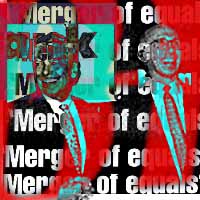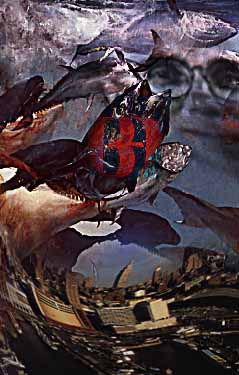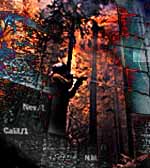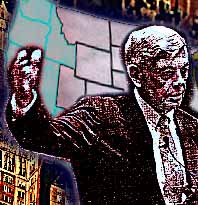| The Ancient Art of
Protection Or What Happened at Bank of America? |
||
| On October 1, 1998, NationsBank and the "old" Bank of America became a single unified entity in a merger that had been described as a "union of equals". About three weeks later, David Coulter, former C.E.O. of Bank of America was forced to resign. The prevailing impression is that Mr. Hugh McColl, the head of NationsBank forced Coulter into this resignation, thereby making it clear that he, McColl, was in control and that the two entities were not equal; that, in fact, NationsBank had effectively swallowed the old B of A to become one of the largest banks in the United States. Before the fateful events of October, Coulter and McColl were often seen together, a very intelligent looking, balding nerd with glasses holding hands with a smiling yet fierce looking "big man" from the south. Coulter had been the force behind many "humane" changes in the inner policies of the old Bank of America (both official and "unspoken" policies) while McColl enjoys having a grenade on his desk and viewing the world of business as a field of war. Given that this new Bank will probably be one of the strongest economic forces in the United States (and possibly the world) in the next few decades, it seems to be worthwhile to ask: what really happened at Bank of America? |
|
|
| Every system includes a subsystem of protection. Or, in other words, every system develops a way to protect itself from the outside, from the dangers that always lie in that unknown land beyond its control. This might be so basic that one could even say that a system cannot exist without some form of protection, that a system is in itself a "protected area" within which other activities are carried out. As a system grows more and more complex, its protectors will grow more and more complex as well until they become partially self-sufficient, the protectors become mini-systems unto themselves, able to move on their own and seek danger where they may find it. (This has been called "the time when the protectors grow wings".) The question of what is being protected, and against what, is too large and complex for the scope of this article, so we will keep these questions moot and limit ourselves to a further penetration of the nature of the protectors. It’s always good to start close to home, so we’ll look at our body. The protectors of the human body are called "macrophages", essentially little animals that swim through the bloodstream in search of invaders to destroy. They are relatively simple structures, but ruthless in their mission. Their one question upon facing the unknown is "does this belong here"? Should this be allowed to continue or should it be swallowed and thus removed from within their territory. Such creatures experience a very straightforward existence: things are either good or bad, they either belong or they don’t, and in either case the response is just as simple. Invisible to our scrutiny they are essential to our continued existence, without them we wouldn’t survive for more than a couple of weeks. But when there are too many "macrophages" in any one area something strange happens: they start to mutate, they change their methods and their enemy. Using the same forcefulness with which they hunted down the invaders they turn upon their own creator, the body they inhabit, and they start to kill it, by multiplying out of control and turning their energy in upon themselves. Imagine a myriad of dark lords of the molecular universe turning against their forgotten origin and purpose and becoming a new form of life, a fierce self propelling structure called cancer. |
||
| Now, a corporation, as the name implies, is a body, a sometimes enormous body made up of smaller, human bodies. It has outside sources of energy, forms of depletion, recurring attacks of friction and entropy and little bursts of creative energy that echo throughout its inner web to push the body forward, to enlarge it or change it in its unceasing grasp for the future. It also has its barriers, its visible and invisible walls that protect it from the great fog that lies outside, and, deep within it, it has its protectors. In their mission, these inner protectors must be strong and unsentimental, their mind has two settings: right or wrong, this should be here or not, this person is doing their job or this person is a problem. Whatever the answer, the protector responds swiftly and without doubt, no further thought is involved, the corporation must be protected, the invader must be eliminated. |
||
|
David Coulter is the former president of Bank of America, where he was much loved and respected by the many thousands of employees. He stated many new "humane" policies in the already very "politically correct" organization. Within the Bank, people refer to him in the same tone that they would use to talk about an older uncle or a grandfather. As you walk throughout the inner halls of the bank, you are bound to encounter many pictures of Mr. Coulter, always with vaguely sad eyes and a kind smile. His background is in mathematics and administration, but within the walls of the corporation he must have learned other skills, in conversations nobody will ever hear, in memos shredded long ago, Coulter must have learned the lessons in human relationships that allowed him to climb his way to the top of the local ladder. Whatever he learned, he learned well, but what was he learning and where was he learning it? Among American corporations, Bank of America has had a reputation for being on the side of their workers, caring for their employees above the call of duty. Corporate executives are encouraged to listen closely to each other, to control their tempers, to consult with others before making decisions, to have long meetings where everyone’s opinion is heard, to respect each other’s differences. All these policies were slowly instated during the time that Coulter climbed the many complex rungs of corporate power, always being heard, always recognizing an underlying trust in what others had to say to him, trusting and being trusted, treat others well and others will do the same… hiding within the safe boundaries of the corporate shelter. |
|
| Taking a left turn into a side street: there’s a problem in many of the National Forests. The Forest Service has been hard at work against fires for more than a century now. Wherever a fire starts, the service is there to stop it. Little columns of smoke can be seen from the distance as the men in their hardhats arrive and helicopters dump tons of water onto the smallest explosion of fire. This is done to protect the remaining forests, of course. The problem is that there is an older method. Throughout geological history, fires started and fires ended, and the strong trees survived and the weak ones vanished. Thus the forests were full of trees that could withstand the occasional fire and the forest persisted. But after a relatively short period of human protection the forests are now full of very weak trees, trees that will light up at the slightest suggestion of lightning, trees that will spread fiery destruction at speeds that were unheard of just two centuries ago. Good trees, beautiful, weak, over protected. |
|
|
|
Hugh McColl is a descendant of old money in South Carolina, he served in the military and in the inner sanctums of local companies, constantly aware of the crushing blow that the South received more than a century ago and feeding complex fantasies of avenging the Southern honor, constantly aware that there were only two paths before him: the path of power or the path of oblivion. Such a choice leaves no choice. Throughout his life even his friends have been nervous in his company, seeing him as someone that is beyond their grasp or understanding. When the others talked of money, he talked of power (the end or motivation being out of the question). In his own climb to the top of his own pyramid, the pyramid that he built with his own inner will and ambition, he had no walls around him, no policies to protect him from denigrating remarks, no human resources department to call for complaints, no head boss to call on to protect him from backstabbers. He thus became his own protector, a protector with nothing to protect but himself. A mutated macrophage. |
|
| When I was a kid in El Salvador, I was a part of the "upper class", the "haves". We had American toys, we were driven to school, we had overflowing quantities of food and medical supplies. We were scrubbed clean and we grew up white and soft. From the confines of my clean room, I lived full of both fear and admiration for the kids on the other side, the side beyond the bushes, the ones who crawled down dirt roads to get to school (if they went to school at all), the ones who built their own toys from pieces of wood found in the garbage and cleaned their knee wounds with saliva, the ones who had no clothes and their ribs were always showing. This "kids from the bushes" would sometimes show up unexpectedly. They were known to be dirty fighters, tricksters and rule breakers. I was warned many times to stay away from them, told that if I played with them I was playing out of my league and would surely be taken advantage of, kicked around or humiliated. I was told I should donate toys and food to them but only through adults, any direct contact was dangerous. David Coulter did not follow this advice and he decided to play with a kid from the bush, a kid who did not (and does not) play by the unspoken rules. Coulter, the simple mathematician and administrator, accustomed to straight answers and straight questions, faced more than a hundred years of repressed anger and thirst for revenge. He didn’t have a chance. |
||
| Through its own inner weakness, through a lack of true
inner protectors, Bank of America has now been swallowed up by a truly effective protector
that mutated long ago into a hungry monster, a kind of animal intent on controlling,
multiplying and ultimately destroying the body that created him. Coulter was weak and
powerless before such an enemy. McColl found in him an easy prey, a soft rich kid ready to
be handled, tricked and discarded. In either case, the ancient art of protection has been
forgotten. A protector must be powerful and effective but it must also be at the service of a higher body, a structure to protect. Without such a structure, the protector is a sickness, an evil predator without a reason to exist. A structure without protectors is a castle without guards; a clean, lit place which the predator can spot from the distance as it closes in for the kill. Be careful out there. McColl is only one of many. |
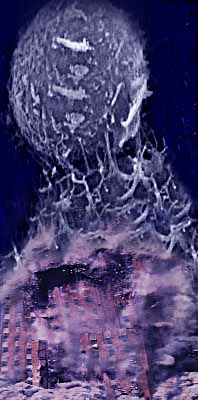 |
|
